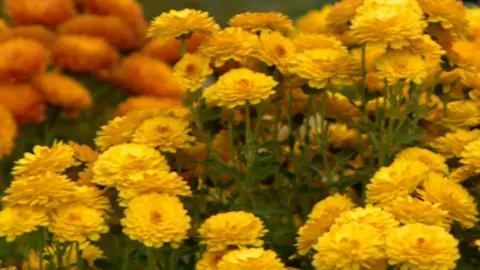Brexit: Irish Sea Border to affect plant and seed imports
 BBC
BBCThe Irish Sea border could soon influence the contents of your herbaceous border.
At the end of the Brexit transition on January 1 Northern Ireland will stay in the EU single market for goods, while the rest of the UK leaves.
That will mean new checks and controls on some goods as they enter Northern Ireland from Great Britain.
Among the goods affected are plants and other horticultural products like seeds.
At his garden centre near Larne in County Antrim, John Shannon describes the current process for importing plants from GB as "easy peasy".

"The only paperwork at the minute is the delivery docket. But as of January 1 that all changes, big time," Mr Shannon told BBC News NI.
The EU has controls on plants entering its single market to make sure they aren't carrying pests or disease.
That will mean plants crossing the Irish Sea will be subject to new inspections, new paperwork and new costs.
'Cost and delay'
The biggest change is that plants will need to be accompanied by a health certificate which has to be issued by a qualified plant inspector, who will charge a fee.
Mr Shannon thinks that is inevitably going to mean cost and delay.
"The nursery in England will put all the plants on a trolley ready for dispatch, they phone the plant inspector he will come and look at them.
"But this could take a day, two days, a week because there's not enough plant inspectors.
"While those plants are sitting on the trolley they're deteriorating because they're a perishable product like food."
He already has suppliers raising doubts about whether they will continue to supply the NI market.
He could switch to suppliers in the Republic of Ireland and the Netherlands, but fears that consumers will still lose out due to reduced choice.
There is another potential problem on the GB-NI route.
As things stands seeds from GB cannot be sold in Northern Ireland from January 1.

In recent weeks some GB seed companies have been emailing Northern Ireland customers telling them to get their last orders in now.
That is because the EU has not yet granted GB "third country listing" for the supply of seeds and other propagating material.
Third country listing is a recognition from the EU that a country meets the minimum standards to supply a product into the single market.
The UK government has submitted third country applications to the European Commission.
The commission has in turn requested additional information on several technical issues which the government has replied to and is now pressing for the approvals process to be expedited.
But even if that issue is resolved by the end of the year the need for new paperwork and inspections remains.
The UK is pressing this issue at the Joint Committee, the UK-EU body which oversees the Brexit withdrawal agreement.
It is emphasising the requirement that both parties must use their "best endeavours" to avoid new controls at Northern Ireland ports.
'Speedy resolution needed'
The Horticultural Trades Association (HTA) says that clarity is needed now.
"As yet, there has been no progress in establishing a solution to the deeply complex proposals and we will continue to highlight the unique plight of horticulturalists in Northern Ireland with a view to finding a solution," says the HTA Chairman, James Barnes.
"We need a speedy resolution to the fact that as a result of the current proposals for arrangements into NI from GB, GB-based growers are placed at a distinct competitive disadvantage to their European counterparts when supplying product into Northern Ireland.
"As a sector, we fully support processes which protect and improve biosecurity, but they must be clearly communicated, not unnecessarily complex and costly, and set up and administered correctly."